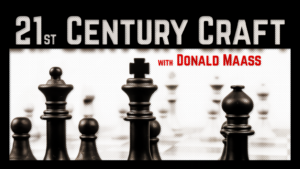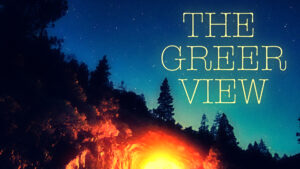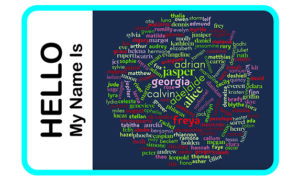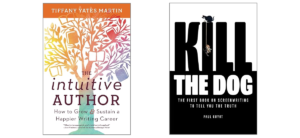REAL WORLD
We’ll be taking a short break for the holiday, but we’ll be back on December 2nd.
Thank YOU, WU Community, for supporting this site, for leaving comments, for writing on. We’re grateful for you.
Read MoreNaming characters is my least favorite part of writing. A character’s name imparts more than just a moniker by which to differentiate actors in a plot. Names are powerful—they provide limits and possibilities to what the character might be or do. For me, the wrong name for a character throws things off in the writing. A character that has not been given the right name misbehaves. Beatrice would not speak the same way that Susan would. Ernest would choose different clothes from Roderick. Until I find the right name for a character, they don’t willingly occupy their role within the larger story.
While clearly I tend to overthink things, these expectations are extensively influenced by stereotypes and preconceptions. The connections we make when we hear someone’s name are as instantaneous, as deep-rooted, and as difficult to shift as first impressions. Getting them right is worth a little extra time and consideration.
I’m not going to tell you how to choose or derive a name—there are numbers of name generator tools on-line. I’m going to try to highlight the complexity and variety of ways in which a name can influence first impressions to help provide you with ways to assess what name best fits your character and your story.
The Power of Names:
Names create expectations, not just of the person’s individual characteristics, but also of their background:
Read More
A week ago today, WU’s wonderfully wise resident Druid, Juliet Marillier, wrote an essay titled Small Good Things. The piece really spoke to me. Whether or not you’ve already read it, this bit from her opening bears repeating:
“Shadows loom large over the future. Louder, more aggressive voices threaten to silence our words of hope, courage, defiance, protest. At such times it’s all too easy for the small good things to be lost or dismissed in the face of our fear, our anxiety, our anger that this has come to pass. It’s all too easy for the writer to fall victim to despair.”
Damn, I can almost hear that as a narrative voice-over, delivered by Cate Blanchett as Galadriel, recapping my life over the past few weeks. It feels like the landscape has shifted underfoot. Simply carrying on feels like a quaint notion in a world that has so alarmingly unmasked itself. I’ve felt a strong lure to simply withdraw. Which reminds me that, as an aging, straight, white male, I’m quite privileged; so many folks from so many other demographics have no such option. Recognizing it makes me feel like continuing to use my voice is a duty. Writing is fundamental to who I am. But continuing to write now requires more than merely carrying on. In many ways it feels like starting over. To do my duty is to begin again.
Serendipitously, my current project is exactly that—starting over. While I wait for a cover image prior to the release of book three of my trilogy, I’m starting on book four. It’s a complete rewrite from scratch of my very first novel-length story, first begun almost two decades ago. I’m taking this as a sign, pointing me to the path that I hope will lead me through the dark, dystopian forest ahead.
I recently responded to a post on Twitter (I refuse to call it anything else, and I’ve mostly moved on to Bluesky), asking experienced writers for advice for an aspiring writer, seeking to make a start. My response seemed to resonate. Which reminded me that I need to heed my own council. Which I realized needed to be fortified beyond pithy aphorism.
Writing about what I’m grappling with is my best path to understanding and acceptance, so I thought I’d include all of you in the process. I don’t expect that any of this will feel all that fresh, but hopefully my thoughts will reinforce belief and reinvigorate practice as we all move forward. In that spirit, I’ll be using the terms “us” and “we” in reference to the advisee throughout.
Advice for Advanced Beginners
* Screens will not avail us! – If we’re going to make a solid start, we need to carve out some space and time. By that I don’t mean just hours in an empty room. I mean clear-headed time, free of distraction, allowing us to ruminate and compose, to reread and revise. And to hit finish points (more on these in a moment). I’m talking about more than cutting back on TV and doomscolling. We need to work on curbing the urge to check screens during our work time. The outrage machine is toxic to the health […]
Read More
In my August post I talked about writing in turbulent times, and suggested it might be easier to keep going with our creative work if we remained mindful of the small good things in our daily lives. Since I wrote that post our world has become even more turbulent. Shadows loom large over the future. Louder, more aggressive voices threaten to silence our words of hope, courage, defiance, protest. At such times it’s all too easy for the small good things to be lost or dismissed in the face of our fear, our anxiety, our anger that this has come to pass. It’s all too easy for the writer to fall victim to despair.
I’ve come close to it myself, despite my posts celebrating the beauty of nature, the wisdom of storytelling, the strength of our inner spirit. For me, the monumental threats to the planet and to the world order are joined by troubles that loom large in my everyday life – small troubles, some would say, but gut-wrenching on a personal level. My two elderly rescue dogs have been my close companions since they came into my care over three years ago, after being removed from a situation of appalling neglect. For those three and a half years they’ve been doing well, making the most of their second chance and becoming well-known local identities (being small, cute and near-identical helped.) But now both have developed life-threatening health problems. Seeing them suffer is terrible. Managing their situation gobbles up a lot of writing time. Anxiety banishes the muse just when I most need her. Yes, I am in the middle of writing a novel, and it has a looming deadline.
So how do we keep on going when things are hard? How do we help ourselves stay sane, balanced, rational, able to keep writing, to keep speaking out, to keep helping others, be they human or something else? How do we stop ourselves from simply shutting down, creeping into our dark burrows or rolling up hedgehog-style and trying to pretend none of it is real? And how is it that I, who so often write reminders to find beauty, wonder, positivity in this troubled world, seem not to be heeding my own good counsel?
It took a dog to remind me. One of the symptoms of Rocky’s complex medical condition is inappetence (a word that was new to me, meaning loss of appetite.) Part of managing his condition is a special diet. He also needs twice daily medication that should be given with food. My boy was visibly wasting away, not his old self at all, and (of course) he hated the special diet. Meal times turned into lengthy, stressful sagas, not always ending in success. For the first time ever, the old trust between human and beloved dog was on a shaky footing. I might add that I am an experienced carer for old and chronically ill dogs, having fostered or adopted similar rescue animals for at least the last 15 years or so.
So what changed? Well, the eating battle is not yet entirely won. But the moment Rocky decided to accept one, then two, then quite a few hand-delivered morsels of food felt like a blessing. Seeing the old […]
Read MoreAs a connoisseur of writing how-tos (and yes, I had to look up how to spell connoisseur – and okay, “addict” might be a more accurate word), I have read a TON of them. And while I find valuable nuggets in nearly all of these books, lately I’ve noticed that many recent writing how-tos are essentially sharing slightly different flavors of some very similar core information.
So when I encounter a book about writing that offers some new (to me, at least) ways of looking at the craft, I sit up and take notice. My gushing ode to Chuck Palahniuk’s Consider This in this 2020 post is an example.
I just finished reading another such departure from mainstream writing how-tos: The Intuitive Author, by WU’s own Tiffany Yates Martin, who, in addition to being a wonderful writer and editor, is also an insanely good teacher and public speaker. Seriously, if you ever have the opportunity to attend one of Tiffany’s sessions or events, take it. And if you’re an author who speaks at literary conferences, trust me: you do NOT want to follow Tiffany. She’s that good.
Having seen Tiffany’s amazing presentation on backstory at WU’s brilliant 2022 OnCon, I knew what an extraordinary editorial mind she has, and how good she is at getting under the hood to amp up and improve your writing at multiple levels. So with The Intuitive Author, I guess I was expecting a book full of deep analysis into the mechanics of writing, along with some sophisticated editorial techniques. Instead, much of the analysis she offers in the book leans more towards the psychology and strategy involved in pursuing – and ideally, enjoying – the life of a writer.
I quickly realized I was not reading The Average Writing How-To, and I dove into the book with my curiosity piqued. (And yes, I had to double-check whether it was “piqued” or “peaked.” Got it right the first time – yay! Hey, it’s the small victories. But I digress…)
In short, The Intuitive Author is filled with insights and perspectives quite unlike those offered in the vast majority of writing how-tos currently on the market. And reading Tiffany’s book made me think about another writing how-to I’d recently read that takes a pretty big departure from most conventional writing wisdom: the provocatively titled Kill the Dog: The First Book on Screenwriting to Tell You the Truth, by author and screenwriter Paul Guyot.
What does this Guyot dude have against dogs, anyway?
Nothing, actually. Instead, the animal Guyot truly hates – and is taking a not-at-all thinly veiled swipe at – is the cat. Specifically, the cat in the well-known “Save the Cat!” series created by the late Blake Snyder.
If you’re not familiar, Snyder’s initial Save the Cat! book (STC to the cool kids) burst onto the scene in 2005 with a VERY structured set of templates for storytelling, which he reverse-engineered from studying many successful movie scripts. Targeted at aspiring screenwriters, Snyder’s methodology offered a compelling framework for them to adopt […]
Read More
Lately I’ve been struggling to love my runs.
Life has been busy with kids’ fall concerts, friend and family gatherings, tying up work projects so the holidays don’t throw me completely out of my plot lines and cause a beginning-of-the-year panic, not to mention a deadline pileup. The stress can get to me, make me feel heavy, which makes running much more difficult. It’s easy to say, I guess I’ll just cut this one short.
I don’t, though. I make sure I finish, no matter how slow I log that last mile
I learned a long time ago the importance of finishing what I start, and long-distance running reinforces that lesson every time I head out the door. It’s good practice for finishing what’s hard.
Writing is hard. Finishing my (hard) runs is good practice for finishing my (hard) writing.
If I start my run or writing session thinking, We’ll see how many miles I feel like doing or We’ll see how many words/chapters I feel like doing, I won’t do all I could have done. It’s just a fact of existence. The mind is a powerful vehicle, and if it thinks, Yeah, this is really challenging, I’m just going to give myself a little break, that’s exactly what we’ll do. We’ll give ourselves a little break.
And miss out on what’s waiting on the other side of that challenge.
What’s the big deal about finishing what you start?
Well, it turns out it’s an important practice if you want to hone your creative discipline, build your confidence as a writer, and grow both professionally and personally. And, of course, it helps us achieve our goals. Finishing what we start is an all-around important discipline because it has psychological, neurological, personal, and professional benefits.
This essay is a bit more scientific than my previous essays because (1) I love science—especially brain science—and (2) I believe that when we know the benefits of something it makes it slightly easier to make that thing a part of our lives. So bear with me.
Psychological benefits
The brain rewards completion. What this means is that any time we finish something, like a writing project, the brain releases dopamine, the hormone responsible for our feelings of pleasure and satisfaction. Dopamine comprises part of our reward center. It carves a “wow, that feels good” into our memory and boosts our motivation to repeat the action.
So our brain remembers how satisfying and pleasurable it felt when we finished that challenging, never-ending project, and it says, “Hey! Let’s do that again, because I like this feeling!”
This is something I’m constantly trying to help my ADHD kids master. The ADHD brain has a lower level of dopamine than a neurotypical brain in the first place, which makes finishing things challenging (so I do understand that some of us might be working at a disadvantage). But practice makes progress. Every time we finish what we start, we practice that discipline, and it gets a tiny little fraction easier the next time.
Other unrelated writing things (but everything’s related, isn’t it?) that boost our dopamine levels include yoga, exercise, and meditation.
The brain also craves completion, so when we mark that task off our list—whether it’s writing a chapter for the day or completing a whole book—our brain sweeps […]
Read MoreMy mother has one of the so-called “superpower genes,” which boosted her capacity for resilience beginning in childhood. She likely needed it; her father fought against authoritarianism during WWII, earning a Purple Heart on Germany’s border.
I literally don’t have this gene. When confronted by threat, my impulse is to withdraw into a quiet, private space, away from others and even my art. It’s something I have to actively resist, which means I need to build resilience within myself, complementing my “nature” with some self-“nurture.”
But how?
Reach for an Anthem
It’s usually our friend Vaughn Roycroft who reaches for song lyrics, I know, but today I’m thinking of a song that’s long been a favorite of mine, “Love Don’t Go” by The Family Crest. There’s something about it that has always struck me as triumphant despite lyrics that can ride in the other direction. I’m writing with some new thoughts on that today as this earworm settles in with my permission and gratitude. (I’ve embedded the song at the bottom of this post, if you’d like to hear it first.)
So you lost your head inside your heart
And the weighty world it tore you apart
And you’ve all but given up
On the stone you call a heart, you’re singing out
If you’ve ever poured yourself into something you believed in, only to watch it falter, you’ll feel the truth in these lyrics about the weighty world’s effect on your spirit. When you care deeply about something and invest yourself in a cause that fails, it can feel like heartbreak. But in these moments of loss, there is also an invitation.
Sing it out
Creativity often finds its power when artists are driven to “sing it out”—to express pain, loss, or unfulfilled dreams through their craft. To use their struggles to add authenticity and depth to their work rather than retreat. Across generations, storytellers of all walks have transformed setbacks into fuel, finding purpose in the act of creating, despite life’s challenges.
Despite.
And because of.
My unquiet mind, even in the midst of [gestures to everything] nudged at me to use it. To see that the lens of my story, already large, could be larger yet. And what would that look like? An idea flooded in about the deeper roots in a dysfunctional system in my story, and I scrambled for a pen.
Oh, the love you’ve placed inside my hands
Oh, the fervor that your heart demands
Well we went off with a spark
But you were left out in the dark, singing out
Oh, sing it out
The gift of hard times for an artist is its nudge to recast what we thought we knew about the world and its people in order to bring a greater texture, power, and insight to our art. And the beauty of art, in part, lies in its ability to transform what’s heavy in our hearts into something even more authentic, which in turn can make it more relatable and even bridge divides.
Oh, love, you wanna step outside
Find a place to run and hide
It isn’t that it’s tough
It’s just that I don’t love you enough
Clouds will cast a shadow—it’s simply physics. Likewise, dark times can make us question the value of what […]
Read More
You’ve done it! You’ve finished the manuscript that has overwhelmed your very being, haunted every hour of awakeness (and let’s be honest, also haunted your dreams). Now, for the next step:
Humans must read it.
Not Grammarly. Not ChatGPT. Not you.
Humans.
In the writing world, they’re often called beta readers. Finding beta readers can be like finding friends on your first day of high school. Remember being a freshman?
The round tables were full of unfamiliar faces, all closed in together, backs to you. Even if there was an empty chair, dare you sit? Dare you ask them to… READ YOUR MANUSCRIPT?!
Here’s the thing. You have to.
Humans must read your work. Finding those humans can be a challenge, yes, but here are the ways I’ve found beta readers.
First, there is someone in your life who reads. Maniacally. They’re the book-a-day library person who’s at every local book signing and posts cozy pictures of tea, cats, and novels. In the background of their photos, there are shelves and shelves. It doesn’t matter what genre they read, trust me. If you’re friendly with them, ask them to read your book.
Not only will this person devour your book quickly, but they’ll also likely give you valuable feedback based on the sheer volume of books they consume. They know the formulas, the character arcs, the plot devices, the tropes, the rules… and how to appropriately break them.
If they’re given the right set of questions, you can get a lot from a beta reader like this.
Second, there is someone who is an expert on a topic in your book. For me, it was a rhino keeper and two historians. I write animal historical fiction, so I absolutely had to be fact-checked.
Don’t have history elements? Maybe you write sci-fi? Find a local biology professor who has a little Ray Bradbury in them and ask them to read for you. Find a physicist. Find a total Star Wars nerd for your space opera. These people will be valuable to you because they’re well-versed in spotting tiny nuances you didn’t think of.
Again, you must ask them the right questions, and if you do, you’ll get more than you expect from them.
Lastly, the scariest one of all: find another writer. This beta reader will point out your weaknesses, your sentence structures, your too-perfect characters, and your crutches.
I recommend finding at least three beta readers. A reader, a knower, and a writer.
Now that you know who to look for, here’s how to ask them. Get their email address, or if you live close by, take them to coffee.
Please, copy/paste this. I know it can be scary. Use Writer Unboxed, friends, use it!
Subject: Would You Be My Beta Reader?
Hi [Name],
I’m so excited to connect with you! As you know, I’m a (GENRE) writer. I’ve just finished my manuscript, (TITLE), and it would do me a great honor if you’d consider being one of my beta readers.
Although the manuscript is done, I’m reaching out to a select few people to get some […]
Read MoreI’m guessing, given Tuesday’s election, most of us have been living in a world of, shall we say, heightened reality the past few days (if not weeks, or months). So, with no desire to diminish the importance or impact of that reality, allow me to offer a bit of a diversion, one I’ve had planned for some time: here’s an interview with Rachel Howzell Hall, known for her bestselling thrillers, about her turn to romantic fantasy with her latest book.
Rachel has been on a bit of a tear lately: her most recent previous novel, We Lie Here, was both a bestseller and nominated for a Los Angeles Times Book Prize. Before that she had three bestsellers in a row, What Fire Brings, What Never Happened, and These Toxic Things (also nominated for the Anthony Award, the Strand Critics Award, and the Los Angeles Times Book Award), with And Now She’s Gone garnering nominations for the Lefty, Barry, Shamus, and Anthony Awards.
With so much success in the thriller category, why jump ship and climb aboard an entirely different genre? I asked her that question (see below).
Meanwhile, The Last One, which comes out December 3, has garnered significant pre-publication praise:
The Last One can be pre-ordered now at Bookshop.Org, Amazon, B&N, Google Books, Kobo, Apple Books, or at your favorite local bookstore.
How did your agent (and/or editor/publisher) respond when you proposed a book so different from your past work?
Actually, it was my agent Jill Marsal who first reached out with the possibility of collaborating with publisher Liz Pelletier. I was thrilled at the opportunity—Liz is a genius. She was preparing to launch a new imprint from Entangled called Red Tower, filled with high-concept ideas she wanted to bring to life. I was honored to be one of the writers she thought would be a good fit for the project.
I get the feeling that this is a book you’ve been wanting to write for some time—have I got that right? If so, what kept you from getting to it sooner? How long did it take to imagine it, plot it out, and then get it down on the page?
I didn’t realize I wanted to write this book until I actually started. I was pretty intimidated by the idea of tackling not just one, but two new genres. I had never written a romance, and I had never written a fantasy. However, I soon discovered that I still had a lot to say—things I’d expressed before in mystery and crime—but now I had the opportunity to explore them in a world I could entirely create. A world without rules, until I made them.
I was offered the opportunity in July 2022 and began writing. I […]
Read MoreTwo weeks ago, I gathered my courage (it was stuffed in a storage bin under my bed) and volunteered to make calls to Undecideds in Pennsylvania. My even-keeled, deeply-uncomfortable-with-confrontation husband was worried. Rightfully so. I am unevenly-keeled. One of my keels is a sectional sofa. The other, a ping pong ball.
“You might have a hard time,” he said, “not getting into it with people. People can be rude. And sometimes you get into it with people who are rude.”
He was wrong about this. I don’t sometimes “get into it” when people are rude. I almost always and always immediately “get into it” when people are rude.
“There’s a script,” I explained, full of bravado. “And I’m not trying to sway people. I’m only checking to make sure they have a voting plan. Also, these people reside in Pennsylvania, the state that contains the City of Brotherly Love. It’ll be fine.”
I did have a snazzy script to follow. Depending on how the Undecideds responded to my first question, I’d click a button, and instantly be taken to a specific script meant for someone who had responded in that particular way. Like a Choose-Your-Own-Adventure, except that Undecided strangers were my adventure-choosers.
“I’ll stick to the script,” I promised my husband. “I will.”
Alas, nearly 100% of people on the Undecided Brotherly Love list either hung up on me immediately, or, right after I introduced myself, warned that I should, “STOP CALLING!” Or that I, “WASN’T GOING TO CHANGE THEIR MIND!” Or, as one fellow not-lovingly suggested, “GO TO HELL!”
But instead of “getting into it” with these Pennsylvanians, I felt only empathy. These folks have been barraged by politics–TV ads, calls, texts, emails–for months. They weren’t rude. They were weary.
Weary too, I invented a new goal: connect with the weary. NOT to change their minds, but, perhaps to feel less alone in my own weariness.
My selfish, rebellious script went a little something like this:
My name is Sarah, and I don’t know about you, but I cannot WAIT to be on the other side of November 5th. How are you holding up?
Dozens of people still hung up on me. But some did not.
Not-Tanya, for example.
“I am NOT Tanya,” she said, after I asked to please speak to Tanya. “I have never BEEN Tanya,” she continued. “And I will never BE Tanya!”
It seemed that voting registries had mislinked Not-Tanya (the person) with Real-Tanya’s phone number.
“Oh, gosh,” I said. “I have been getting phone calls for ‘Deborah’ and texts for ‘Anna.’ And my husband, Jeff, keeps getting texts for ‘Mark.’ And we are none of those people.”
Not-Tanya and I then proceeded to have a lovely chat, not about politics, but about how NO ONE SAID PARENTING ADULT CHILDREN WOULD BE SO TRICKY. At the end of the call I said, “Well, thanks for the chat, Not-Tanya. Just two weeks until we’ll only be called by our real names!”
And I felt better. Parenting adult children really was tricky. Where, Not-Tanya and I had lamented, were the hundreds of “How To” parenting books that had helped us navigate every stage prior?
Then there was John. John who had moved to IL but apparently had gotten about 300 calls and texts from political volunteers who believe he still lives […]
Read MorePhoto by Squirrelbrand
Dystopia can be enjoyable to write, but it’s painful to live in.
Let’s take a quick peek at cyberpunk. The Oxford Dictionary defines it as:
“a genre of science fiction set in a lawless subculture of an oppressive society dominated by computer technology.”
It has been around since the 60s, showcasing what sci-fi author Bruce Sterling terms “low-life and high tech.”
The world is oppressive, and those within it struggle to survive. There’s brazen violence, class disparity, and clawing despair hidden behind flashy, jaw-dropping technological achievement.
Rosy idealists don’t last long on these mean streets. Anti-heroes only need apply, if you keep your morals flexible even if your intentions are good.
Cyberpunk is hopeless by nature
There are no happy endings. Cyberpunk as a genre emphasizes that “the house always wins.”
If you’re in the system, you cannot beat the system. You can only:
When life imitates art
A quick glance at the news shows a world polarized, in varying states of conflict and chaos, with many places suffering war or environmental disaster. All against a technicolor backdrop of technical promise and A.I. everywhere, for everything.
It’s easy to become overwhelmed to the point of numbness and disassociation.
What’s worse, for some it’s become de rigueur for some to performatively embrace nihilism and extremism. (My Gen Z son taught me the term edgelord, meaning, also according to Oxford, “a person who affects a provocative or extreme persona, especially online.”)
So what’s the point of writing anything in the face of all this pain, hopelessness, and ultimate destruction? Other than playing your violin on the Titanic, or raging against the dying of the light… how will writing do anything in the face of a nightmare?
A counterpoint: solarpunk
Recently, I was fascinated to discover the existence of solarpunk.
While my beloved Oxford hasn’t quite caught up to this one, I resorted to Dictionary.com and got the following definition:
“an optimistic environmentalist subgenre of speculative fiction, art, and design that envisions future life on Earth transformed by the use of sustainable energy, close co-existence of human beings with nature, and progressive sociopolitical values.”
Interestingly, it has some similar trappings of cyberpunk, as far as fast progression of technology, but instead of responding with a projected outcome of decay and destruction, it shows what happens, or rather what could happen, if people are responding differently.
In these stories, there is still conflict and drama. But it’s a different kind of tension – and it shows a potential dream, rather than a prison sentence, thanks to deliberately refusing pessimism. You can read this in works by Ursula K. Leguin, among others.
The rise of cottagecore
I’ve witnessed an increase in offerings that promote what they’re calling “cottagecore” with an aesthetic of coziness, comfort, and natural beauty. Think hobbit holes, or a Hideo Miyazaki film. Technology used thoughtfully, with purpose and with good results… in balance.
For every edgelord, perhaps even outstripping them, there are those people searching for an alternative. They want joy, and beauty, and, to put it bluntly, rest.
In an unrelenting world, they […]
Read More





















